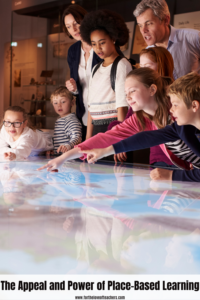
Education trends may come and go, but place-based education has grown in importance in recent years. The idea behind place-based education is simple yet compelling: It uses the environment around you, and even the entire world, to learn. The idea of taking education outside of the classroom offers numerous benefits to students of all ages, and schools are using a wide variety of place-based learning techniques to enhance education. Here’s a closer look at this educational model.
While place-based education may seem like a new concept, the idea of incorporating local issues and knowledge into an educational curriculum was the way children learned before formal schools were created. Most children were taught by their families and by the people in their communities, not by a teacher in a classroom.
 One of the compelling aspects of place-based learning is that it helps students develop connections to their communities as well as to the world around them in a way they might not in a traditional classroom. Instead of simply learning concepts and rules, the student uses them in real-world situations. Lessons may include projects that cross over different disciplines and integrate numerous types of information, encouraging learners to approach the issues in a way that translates to the real world. Instead of learning and memorizing by rote, students apply what they learn. After all, the purpose of knowledge is to be able to use what you learn in real-world situations, whether at home or in a career, and this type of learning facilitates that.
One of the compelling aspects of place-based learning is that it helps students develop connections to their communities as well as to the world around them in a way they might not in a traditional classroom. Instead of simply learning concepts and rules, the student uses them in real-world situations. Lessons may include projects that cross over different disciplines and integrate numerous types of information, encouraging learners to approach the issues in a way that translates to the real world. Instead of learning and memorizing by rote, students apply what they learn. After all, the purpose of knowledge is to be able to use what you learn in real-world situations, whether at home or in a career, and this type of learning facilitates that.
This kind of learning can be performed at any time and in any location — in fact, sometimes it’s referred to as “anytime, anywhere learning.” The ubiquitous availability of Internet connections gives learners access to information from nearly anywhere, but it’s not only the aspect of taking the class out of the classroom that has such an impact. Hands-on or experiential learning can offer students a more comprehensive approach than the traditional classroom approach.

Place-based learning can take place in parks, in museums, anywhere. Learners participate and reap numerous benefits, including higher levels of engagement, academic achievements, and a great sense of involvement in their local communities. It can help increase teacher engagement as well. This kind of learning can also create strong bonds between learners and their parents and the local environment and social organizations, which can help enhance overall community quality of life. Students can also help address local environmental issues. The attached resource, The Power Of Place-Based Learning, describes more about this growing educational trend.
Thanks for reading!
If you like it, then pin it!



Christine Weis is a passionate educator, classroom management coach, wife, and mom of two busy boys. She enjoys teaching, writing, and creating resources for teachers.




What an interesting post and definitely learning about something new. Thanks for sharing this informative post with us.
I find place-based learning cool and sustainable! If you look at the current situation formal schooling is in with all the endless lockdowns and emerging variations of the virus, at the moment, it’s best it’s abolished and replaced with this kind of learning!
This is the first time I heard about Place-Based Learning! I hope to learn more about this. I’ll further read topics about it.
This sounds like a good idea all around!
I have never heard of place-based learning before. It sounds like a great concept and option for teachers.
seems like more fun learning this way! but here in my country, we still cant do the outside learning due to the pandemic..
I love the idea of place based learning! Children learn so much better when they are surrounded by the ideas that are being taught instead of simply having it pushed on them.
I love the idea of place-based learning because it’s more tangible in the sense that local events and places are easily observable as compared to something that is national.
The appeal and power of plant-based learning is an incredibly unique way of engaging the students. I love it. Especially the idea of engaging local events and ideas.
Very useful article for everyone!Thanks for sharing with us.
I LOVE this concept! Memorization and such has always been such a challenge for me, that I often have had to spend hours upon hours studying. It wasn’t until college that it became easier, and that was because instead of the tactics from public school– my classes became more discussion based. With that change, I was able to remember the material MUCH easier because I recalled the concepts I had to learn because of the conversations we had in class — and I didn’t just have to memorize listening to my professors drone on from a PowerPoint. I think this is so great, not only for visual learners, but it gives all types of learners a different method to learn in a fun and interactive way!
I love the idea of including local events and ideas in overall learning. It’s a great way to make the curriculum personal, so the kids are more likely to take it in.